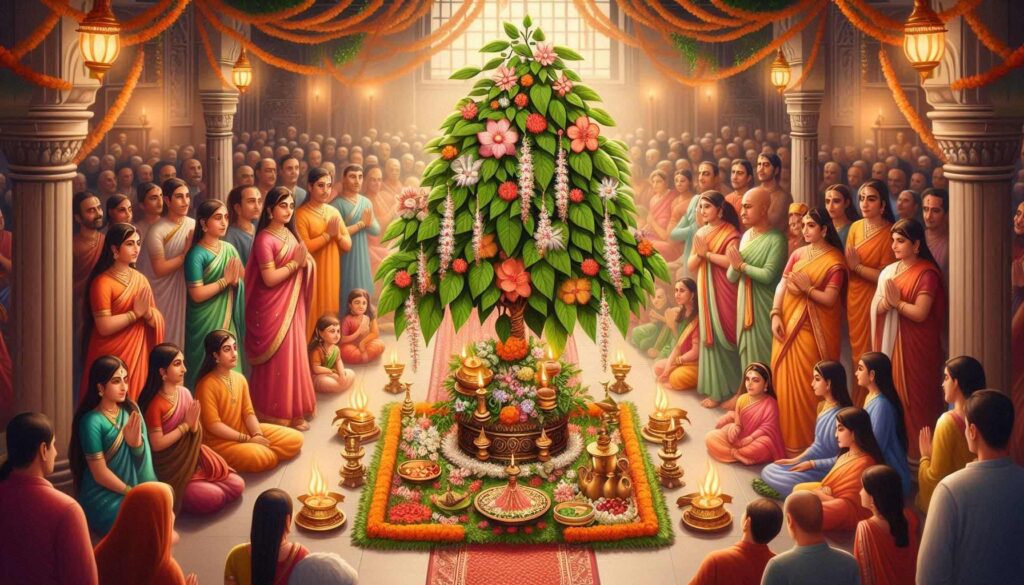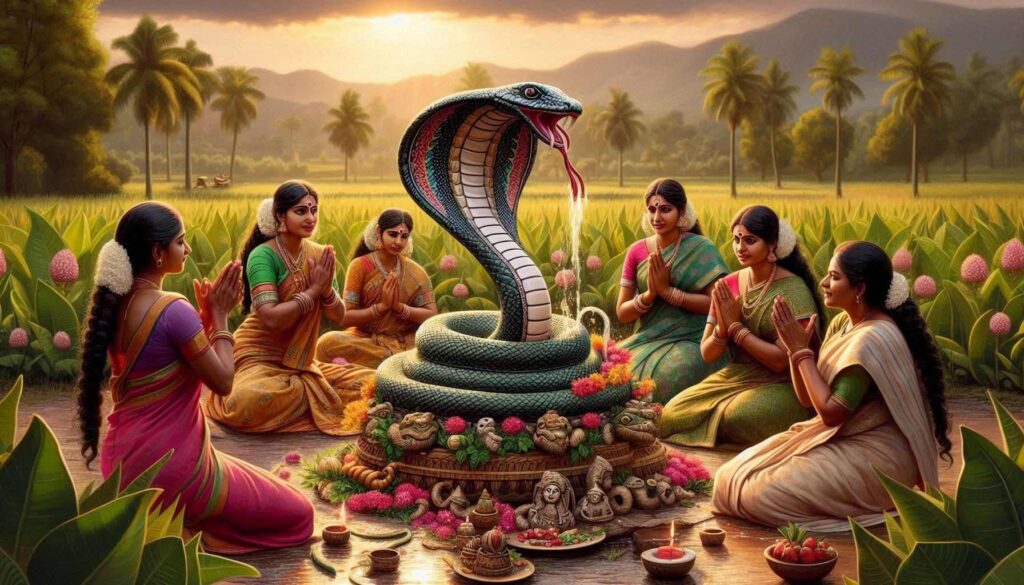Festivals in Karnataka in November 2025: A Complete Guide to Celebrations, Rituals, and Traditions
Introduction
November in Karnataka is a time of spiritual devotion and cultural richness, featuring festivals that honor gods, saints, and natural elements. This article highlights major festivals celebrated across the state in November 2025, exploring each festival’s history, rituals, and cultural significance. These festivals offer insights into the enduring heritage of Karnataka and how it honors nature, devotion, and community.
Read More About Hindu Philosophy
1. Tulsi Vivah (November 1-5, 2025)

Overview:
Tulsi Vivah, a Hindu festival marking the symbolic marriage of the sacred Tulsi plant to Lord Vishnu, is widely celebrated across Karnataka. This marks the end of the four-month period of Chaturmas, a time when marriages and major ceremonies are avoided.
Rituals and Traditions:
- Tulsi Marriage Ritual: Devotees set up small altars for the Tulsi plant in their homes or temples. The ceremony includes applying turmeric and vermilion on the plant, decorating it with flowers, and performing wedding rites with a Shaligram stone (representing Lord Vishnu).
- Festive Offerings: Prasad (offerings) includes sweets, coconuts, and fruits, distributed among family and community members after the ceremony.
- Family Gatherings and Fasting: Many families fast in the morning and celebrate with a feast after the Tulsi Vivah ceremony.
Cultural Significance:
Tulsi Vivah symbolizes the bond between humanity and nature, reinforcing the importance of plants in Hindu worship. In Karnataka, it is an important festival where families gather to celebrate the sacred union and renew their devotion.
2. Karthika Deepotsava (Karthika Festival) – Throughout November 2025

Overview:
Karthika Deepotsava, or the Festival of Lights, is celebrated extensively in Karnataka during the entire Karthika month. This festival honors Lord Shiva, and devotees light oil lamps as a tribute.
Rituals and Traditions:
- Lighting of Lamps: Devotees light lamps in homes, temples, and near rivers, creating a serene atmosphere in the evenings. The tradition reflects reverence for divine light, signifying the triumph of knowledge over ignorance.
- Fasting and Shiva Worship: Many people observe fasts on Mondays and perform special pujas dedicated to Lord Shiva. These rituals involve offering bilva leaves, water, and flowers to the Shiva Linga.
- River Bank Celebrations: Devotees gather near the banks of rivers like the Kaveri and Tungabhadra to release small oil lamps on leaf boats, an enchanting sight symbolic of prayers for peace and prosperity.
Cultural Significance:
Karthika Deepotsava celebrates light and devotion, resonating with people across Karnataka. It strengthens community bonds and instills a sense of spiritual purity.
3. Kanakadasa Jayanthi (November 6, 2025)

Overview:
Kanakadasa Jayanthi commemorates the birth anniversary of Saint Kanakadasa, a 16th-century poet, philosopher, and devotee of Lord Krishna. This festival is of particular importance in Karnataka as it honors a revered saint whose teachings and music continue to inspire.
Rituals and Traditions:
- Special Pujas in Temples: Major Krishna temples across Karnataka, including Udupi, perform special pujas and recitations of Kanakadasa’s hymns and compositions.
- Cultural Programs: Schools and cultural organizations organize events to celebrate Kanakadasa’s life and contributions, including bhajan (devotional singing) sessions, poetry recitals, and lectures on his philosophy.
- Processions and Memorial Events: In some regions, processions are held in honor of Kanakadasa, showcasing his life’s journey and devotion.
Cultural Significance:
Kanakadasa Jayanthi serves as a reminder of Karnataka’s rich bhakti (devotional) heritage. Kanakadasa’s writings promote equality and devotion, and his teachings are cherished in Karnataka’s culture.
4. Bali Padyami (November 7, 2025)

Overview:
Bali Padyami, celebrated the day after Diwali, honors King Bali, a legendary ruler known for his generosity and sacrifice. This festival is especially significant in Karnataka and marks the beginning of the Kartika month.
Rituals and Traditions:
- Welcoming King Bali: In homes, people set up small altars with images or idols of King Bali and offer puja, symbolizing his welcome into their homes.
- Special Meals and Feasts: Traditional Karnataka dishes, including sweets and savory items, are prepared and shared with family and friends as part of the festivities.
- Community Celebrations: Local communities often gather for group prayers and meals, reinforcing social bonds and unity.
Cultural Significance:
Bali Padyami commemorates the benevolence and virtue of King Bali, a beloved figure in Karnataka’s mythology. It’s a celebration of humility and the belief that the righteous will always return.
5. Nagula Chavithi (November 13, 2025)

Overview:
Nagula Chavithi is a festival dedicated to the worship of Naga (serpent) deities, especially revered in rural Karnataka. This day holds significance as a protector of family and agriculture, seeking blessings for protection from snake bites and crop fertility.
Rituals and Traditions:
- Worship of Snake Idols: Devotees offer milk, eggs, and turmeric to snake idols or live snakes in natural habitats, seeking blessings for their families.
- Special Puja and Offerings: Women fast on this day and perform a special puja at home, praying for the family’s welfare and protection from snake-related dangers.
- Community Prayers: In rural Karnataka, people gather to pray at shrines or anthills (believed to be the dwelling of Nagas), demonstrating their respect for these natural guardians.
Cultural Significance:
Nagula Chavithi reinforces the bond between humans and nature, celebrating the power of the Naga deities to protect and prosper. The festival highlights Karnataka’s agricultural roots and respect for nature’s elements.
6. Karthika Purnima (November 19, 2025)
Overview:
Karthika Purnima, the full moon day of the Karthika month, is widely celebrated across Karnataka. Known as Deva Diwali, it signifies the victory of Lord Shiva over demons and is celebrated by lighting lamps and offering prayers.
Rituals and Traditions:
- Bathing in Sacred Rivers: Devotees take a ritual bath in sacred rivers at dawn, especially in rivers like the Kaveri, symbolizing purification.
- Lighting of Lamps: Thousands of oil lamps are lit in temples, homes, and river banks, creating an awe-inspiring visual that symbolizes the triumph of light over darkness.
- Shiva and Vishnu Worship: Devotees offer special prayers to Lord Shiva and Lord Vishnu, seeking blessings for prosperity and spiritual upliftment.
Cultural Significance:
Karthika Purnima is a profound spiritual event, representing purity, light, and reverence for deities. It’s a festival that brings families and communities together in Karnataka to honor divinity and renew their faith.
Conclusion
November in Karnataka brings together a variety of festivals, each celebrating a unique aspect of spirituality, devotion, and community. From honoring historical figures like Kanakadasa to celebrating light and devotion with Karthika Deepotsava, these festivals encapsulate Karnataka’s enduring heritage and the unity of its people.


